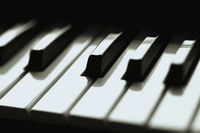Piano Sheets > Woody Shaw Sheet Music > Moontrane (ver. 1) Piano Sheet
Moontrane (ver. 1) by Woody Shaw - Piano Sheets and Free Sheet Music

About the Song
Sheet music, theory and beyond When you take a look at a piano music sheet for the first time, all you will see is beautiful written characters which make absolutely no sense to you. And if you are a keen observer, you will notice that there are many types of circles associated with the piano music sheet language. Sheet music belonging to the instrument piano also consists of incomplete circles connected together by one or a collection of lines. Plus there are other symbols which will appear totally strange to you. So what are they all about and what do they mean? (More...)
Download this sheet!
About the Artist

Random article
Sheet music, theory and beyond When you take a look at a piano music sheet for the first time, all you will see is beautiful written characters which make absolutely no sense to you. And if you are a keen observer, you will notice that there are many types of circles associated with the piano music sheet language. Sheet music belonging to the instrument piano also consists of incomplete circles connected together by one or a collection of lines. Plus there are other symbols which will appear totally strange to you. So what are they all about and what do they mean? (More...)
